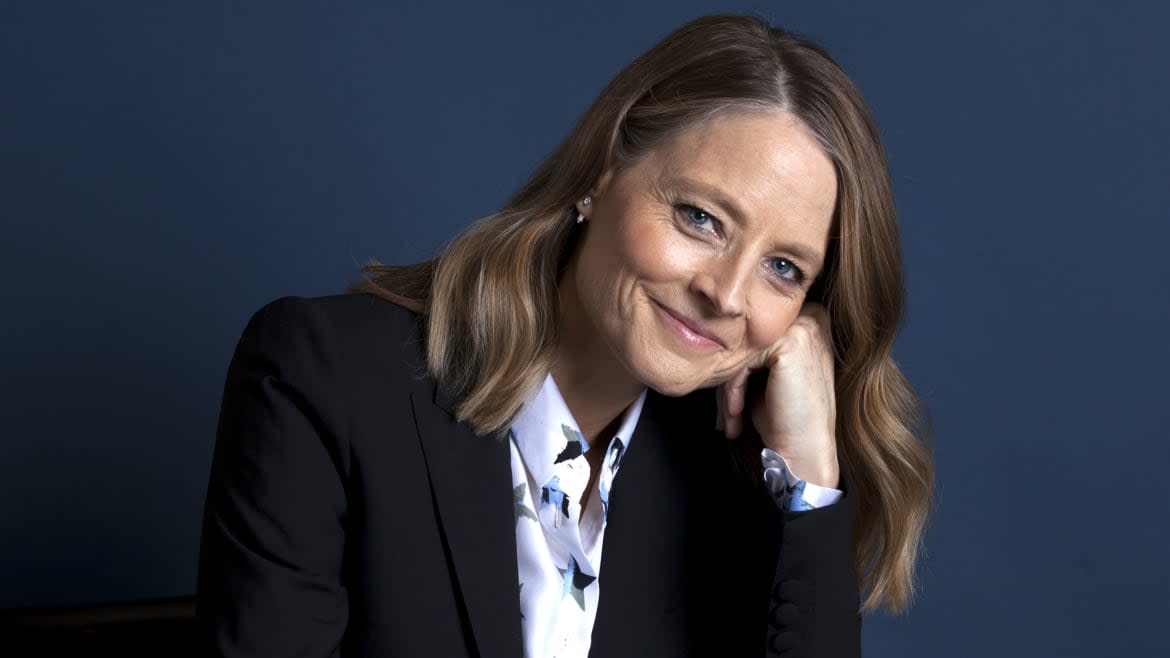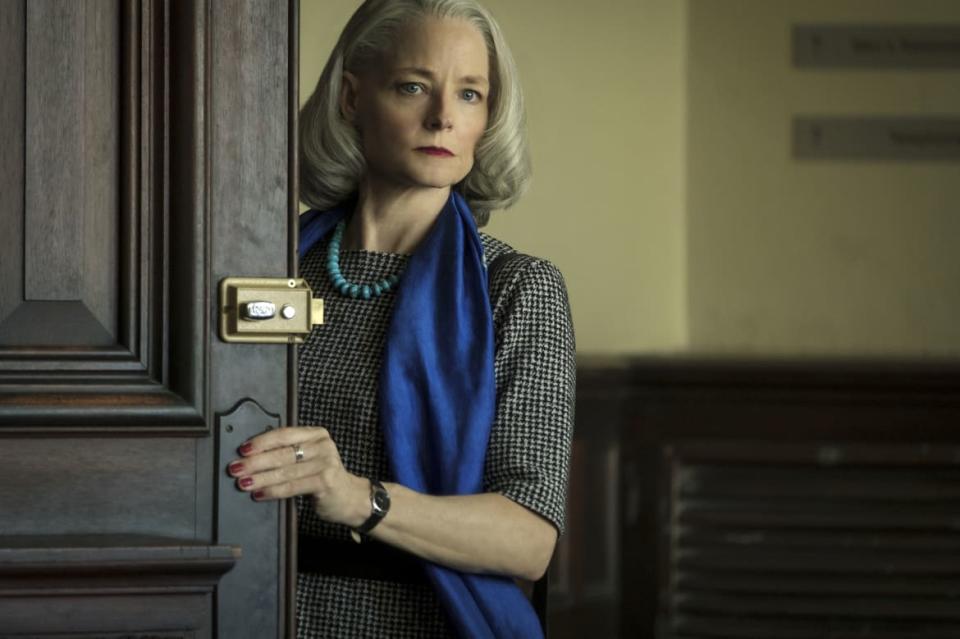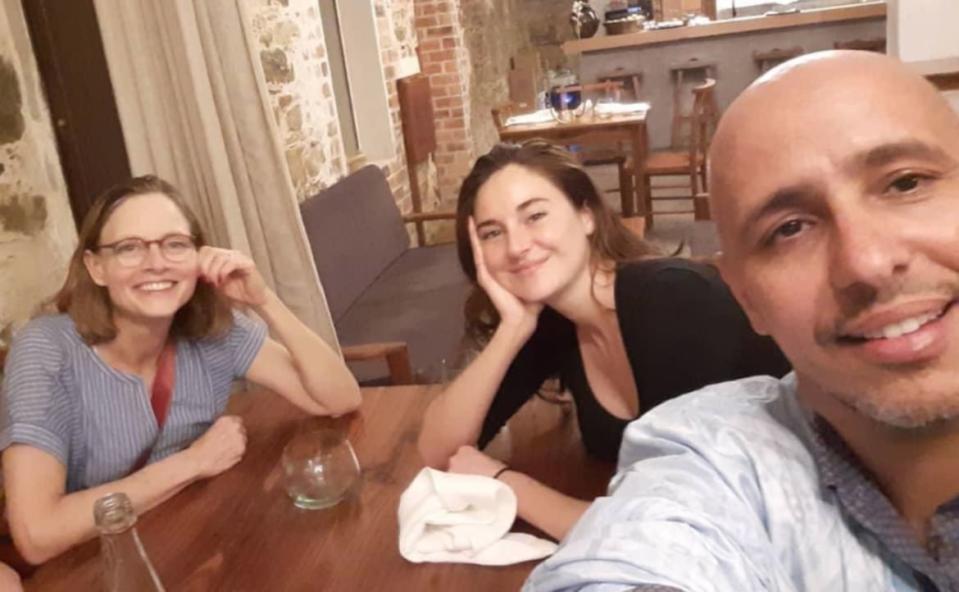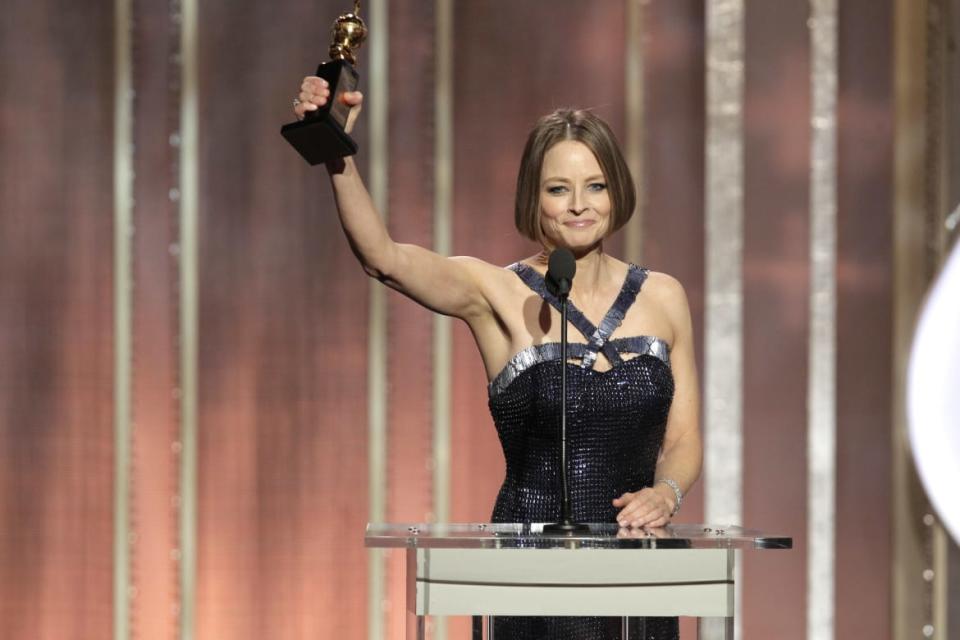Jodie Foster Looks Back: ‘Would I Have Ended Up Dead in a Hotel Room?’

- Oops!Something went wrong.Please try again later.
“When I turned 50, I made a decision to only act in things that I thought were meaningful,” Jodie Foster tells me.
In the eight years since, she’s appeared in a grand total of three films: the dystopian action sagas Elysium and Hotel Artemis, addressing class-warfare and the health-care crisis, and The Mauritanian, which dramatizes the real-life story of Mohamedou Ould Salahi, who was imprisoned in Guantanamo Bay from 2002 to 2016 despite never being charged with a crime. During his time in Guantanamo, Salahi alleges he was subjected to a wide array of torture techniques, including beatings, sleep deprivation, waterboarding, sexual abuse, and a mock execution at sea. He documented his time there in the best-selling memoir Guantánamo Diary, released in 2015 as he was still being detained without cause.
Directed by Kevin Macdonald and hitting cinemas on Feb. 12, The Mauritanian boasts a stunning turn by Tahar Rahim as Salahi, and Foster’s best performance in more than a decade as Nancy Hollander, the defense attorney fighting on his behalf. (They both earned Golden Globe nominations on Wednesday.)
“You’ve got to love him, because he took that experience that could devastate other people and turn them into angry, anti-American, unforgiving people, and through his faith was able to say, ‘No, you’re not going to beat the humanity out of me,’” Foster says of Salahi.
Foster has experienced her fair share of hardship as well—from surviving a lion attack on a Disney film as a kid to being terrorized by John Hinckley, who made an attempt on the life of former President Ronald Reagan in order to impress her. But she overcame them and went on to become one of the most heralded actresses of her generation, winning the Best Actress Oscar twice.
We touched on all this and more of Foster’s extraordinary life over the course of our talk.
How have you been holding up during these strange times?
I’m OK! Look, I’m kind of an internal person—I like to read and watch movies, so it hasn’t been too bad for me. I think the hardest thing has just been watching everybody else suffer and knowing the impact this will have on this generation and future generations to come. That’s been the hardest thing.
Rosanna Arquette Won’t Be Silenced: There Are ‘a Lot More Harvey Weinsteins’
Have you been binging on anything fun?
God, you know, I go through periods where I just get sick of watching movies. But right now I’m watching all of the Oscar films, which is nice. I really loved Nomadland. I loved this documentary called Time. I feel like I’ve seen more movies in the last five months than I’ve seen in years, and yet I haven’t been to a movie theater in a year. So, it’s interesting. I have nostalgia for the cinema experience, although I don’t know if everyone is going to go back to seeing movies the same way.
I hope they do. I miss going to the movies terribly. With The Mauritanian, what compelled you to make this movie? I feel like with the exception of The Report, the inhumane plight of Guantanamo detainees hasn’t been given the movie treatment so much.
It seems to be that time. You know, it’s been 20 years, and I feel like we’re now ready to look at that moment in our history and ask all those tough questions, and say, “How did we get there? What was our part in it? What could we have done differently?” And periodically, we have to do that piece of reconciliation if you want to make sure the mistakes you’ve made don’t get repeated again.
There’s an extraordinary level of hypocrisy in the U.S. operating Guantanamo Bay, because we like to play the role of moral police around the world, and yet we’re running this facility which runs contra to anything we purport to believe in.
Yeah—a legacy of the Bush administration, and of their “by any means necessary” philosophy. The idea that there’s a prison that operates outside the Constitution, that’s controlled by us, that our military runs, and yet it’s offshore so we feel like we don’t have to follow the Geneva Conventions, that’s pretty outrageous. I think we all agree it should be closed. Obama wanted to close it and wasn’t able to. I’m not sure why. And it’s really expensive.
The post-9/11 years are a time where America really lost sight of what it purports to stand for. Do you think the country has properly reckoned with that period? To have Guantanamo Bay still open, and even people like George W. Bush have Q Scores that aren’t nearly as low as they should be.
It’s a really interesting moment in history. I’m an American, and I was there during 9/11. For me, I remember the fear and the terror—and that huge swell of emotion that we were caught up in, because we had never been in that place in our history. When those fear and terror emotions are so high, that is when the government has a responsibility to turn to the rule of law, and to look at the Constitution and our foundations. They’re there for that moment—to make sure we stay on a moral path. And they tossed them out the window.
And you were pregnant around the time of 9/11?
I was. It was 10 days before I was about to have my second child and I was on bed rest, so I stopped watching television.
Oh my god.
9/11 was the first day of my older son’s pre-school, so it was a really vulnerable time for all of us; a confusing time for all of us. No, the government did not act perfectly and there were other emotional circumstances that had to do with that, but you can’t take the Islamophobia out of it. We were too busy thinking that all Muslim men were terrorists. I think this movie does a really good job of portraying, for one of the first times, a Muslim male character who is complicated and full of contradictions, and who you both love and you hate, and you get to see the film from his point of view. That’s a real plus. He has a lot to teach us.
I’m sorry to go back to this, but you were supposed to deliver 10 days after 9/11? Did that lead to some sort of philosophical moment where you were thinking, “What world am I bringing this child into?”
I don’t know. I was in Los Angeles and all of my friends were in New York City, and they all lived downtown. It made me want to buy a place in New York and move there. When people are going through something difficult, I want to be there for them. That’s how it shifted and changed me. It was tangible, right? In that moment in history, people would help each other, and we were all on the same side. It was an opportunity to us to be the Americans that people were looking toward, and somehow that feeling didn’t last. We went off into the Iraq War and squandered that feeling.
I vividly remember the speech Michael Moore gave where he was booed off the stage for criticizing the Iraq War.
Yeah… We have these dark moments in our history, and we’ve got to go back and take a look at them. Whether it’s the Jim Crow South, the Trail of Tears, or Japanese internment camps, we have to look at our history and say, “OK, we’re all human but how do we make sure that doesn’t happen again? How do we squeeze that element out of our system so we don’t cause people to suffer unjustly?” Nancy Hollander is part of that. Her whole mission in life has been to challenge authority, challenge government, and challenge systems.
Do you feel there’s been a broader lack of accountability from the Bush years? I don’t think a single high-level official went to jail for getting us into a fraudulent war.
Not only that, but Gina Haspel burned the evidence [torture tapes] and then became a Cabinet member in the Trump administration. It’s like, what?! She burned documents that were incriminating? It’s so infuriating. I don’t really care so much about punishing as I do about enlightenment, and making change happen. Art can do that. We can have a conversation about taboo topics, and you can demonstrate to people that they have to revisit the past and challenge it.

Jodie Foster in The Mauritanian
I’m dreading how Hollywood will handle the Trump administration in the coming years.
It’s not gonna be me. It’s so broad that it’s not gonna be good. It’s gonna be broad satire.
Only Iannucci may be equipped to handle it. The past four years have been utter insanity. Are you relieved to be hopefully turning a page?
Look, I’m kind of a romantic. I’m hopeful, and buy the Obama Kool-Aid that, like MLK said, the arc of history is long and bends toward justice. I believe in that. My kids think that makes me a lowly moderate, but I’ve lived longer, so I know that we can heal from things, and some of the emotion that they’re feeling—the injustice, the outrage—is because they’ve never seen it happen before. My kids never lived under Reagan and don’t know about injustice coming from the government, so they’re outraged that the government lies. And I’m like, “Yeah, the government lies! We knew this already!” Some of it is romantic—about believing in democracy and ultimately this wake-up call, this challenge that we had, can make us become better instead of worse.
I’ve followed your career pretty closely, and I read that you almost quit acting prior to The Accused. Do you ever think about that fork-in-the-road moment?
I always think about that, because I’m always thinking about quitting [acting] and the path that I didn’t take. Every six months I go there. Because I don’t have the personality of an actor and I never thought I was going to act for the rest of my life, and I thought I would be an academic or a writer. I know there’s a college professor out there going, “I could have been an actor.” You take one path, and then you can’t stop thinking about all the things you didn’t do. But you wouldn’t be who you are if you hadn’t followed that path.

The Mauritanian actors Jodie Foster and Shailene Woodley with the real-life Mohamedou Salahi.
I loved watching your recent Variety talk with Anthony Hopkins, and it’s wild to think that The Silence of the Lambs turns 30 this year. It’s also I believe the last film to take the Big Five awards at the Oscars.
That’s right!
I’m a big fan of The Silence of the Lambs, and rewatched it recently. But I’m curious how you feel it’s aged as far as its depiction of transgenderism.
It was over 30 years ago, and was one of the first transgender characters onscreen, unfortunately. They were not represented at the time, and we were very clear—and Thomas Harris was very clear in the book—that Buffalo Bill is not a transsexual, and that was the word that [Harris] used that we used at the time. He is somebody who hates himself and wants to change, and he is mistakenly identified. He wants to change this psychosis and this compulsion that he has, and he will use whatever this idea of “change” is—the moth metaphor, etc. I think that was in Jonathan [Demme’s] movie, but I think that he would tell you, as someone who wants to be a good filmmaker and who cares about the world, he took the criticism and that he wishes he could go back and revisit the movie, because we know so much more now. We welcome criticism as filmmakers, because it’s an opportunity to have a conversation that makes us better filmmakers. And look—maybe that discussion helped pave the way to where we are now. That’s what movies can do, they can open up discussions, and we can disagree, and we can want to get better.
There’s this alternate timeline where you’re in the Brat Pack, because from what I’ve read, you were strongly considered for the Molly Ringwald role in The Breakfast Club and offered Pretty in Pink. Have you thought about that teen idol road not taken?
We were just talking about that yesterday—about all those movies, and all those actors. And I knew all those actors, because I’d made a movie with Rob Lowe [The Hotel New Hampshire] and he’d introduced me to all those people. Yeah… Those were choices that I’d made on purpose. I happened to be in college [at Yale] and they were here [in Los Angeles]. At the time it was kind of hard, because everybody seemed to be doing something that everybody was responding to and I was at university and not part of it, but looking back, I’m really happy with the choice that I made. I think it’s much more in tune with the person that I am as an actor.
Almost a decade ago, I oversaw a piece you wrote for us about Kristen Stewart. And it was a lovely piece about the Hollywood machine, the way that it treats its young stars, and harsh scrutiny that its young stars are put under. I’ve been meaning to ask you since editing that piece if you feel Hollywood provides the right support and protections for its young stars, and do you feel you were given the right support and protections—especially tackling roles like Taxi Driver, which was a very complicated character to do at such a young age.
Specifically, women are thrust into the media. I grew up in a time that didn’t have the long lenses and the same amount of scrutiny, so I don’t know if I would have survived this time in history intact. I don’t know. Would I have ended up dead in a hotel room? I don’t know. These are the questions you ask yourself: How did you survive, psychologically and emotionally, very complicated circumstances? I don’t know whether it’s Hollywood. It’s hard for me to fault Hollywood, because Hollywood is filled with my grandfathers, who loved me and cared for me. And I had my mom too, who shepherded me, supported me, and took care of me. I sometimes liken it to—and maybe I said that in the article—we’re all holding up this survival tool that gets us through, and in my case, and maybe in Kristen’s case, there is a compartmentalizing that we had to do in order to survive intact. And thank god for the survival tool, because we were able to get through it intact, but it takes a toll on you. I can honestly say that what I had to do in order to survive intact in this industry took a toll on me as an adult, and it’s taken a long time to come to terms with that.
That essay was also about privacy, and I know you’ve kept your private life intensely personal. This is a sensitive subject so don’t feel obligated to answer, but was it because of Hinckley that you chose to keep your private life so guarded? It’s an unbelievably crazy thing to happen to a teenager who’d only recently entered the public eye, and who just started college.
Yeah. I guess I’d probably refer you to an article I wrote when I was 22 for Esquire called, “Why me?” At the time I said, “Look, I’m not going to talk about it because I don’t want to give more airtime to this historical phenomenon, and I want to be known as an actor.” So, I’ll probably say the same thing. But I would refer you to the article, because I think the article answers those things in my own voice. I’m glad that I was able to control the circus a bit so that I could have a real life, and ultimately have the career that I wanted by not being just associated as “the girl in the historical phenomenon.”

Jodie Foster receives the Cecil B. Demille Award on stage during the 70th Annual Golden Globe Awards on January 13, 2013, in Beverly Hills, California.
I think you’ve moved way beyond that. Another thing that happened to you at a young age that was completely nuts, and that maybe some people don’t know about, was the lion-mauling [during the making of 1972’s Napoleon and Samantha]. Are you and Melanie Griffith in some sort of support group for Hollywood lion victims or something?
It’s a crazy story! I mean, it’s kind of a great story. It’s a story I love to throw out at cocktail parties, but it’s also sort of a weird metaphor—that this lion was mistreated in some ways, and I got picked up in its mouth and shaken, and when I turned around, all fifty people on the crew just left. And I was upside-down being shaken, so I was shaking, and seeing everyone that I knew just leave. They all left.
They left a child in the mouth of a lion?
They all left because they were scared. And the lion trainer said, “Drop it,” and when he said that the lion was trained to drop whatever was in its mouth. So yeah, that was my story. It’s kind of an amazing story!
I was doing research for this interview and reading reactions to your famous Golden Globes speech at the time, and they were incredibly hostile. Did you read those criticisms at the time and were like, you know, this is why I don’t do this shit! To come out with something so personal and then have people rip it to shreds must have been difficult.
You know, once again, I think that there are a lot of self-protections that go in so you don’t expect to be understood. If you go back and actually read the speech that I wrote, as if you were reading a speech, I think there will be a lot of resonance—and I counted on there being a lot of resonance 10, 15, 20 years later. Not that anyone needs to go back and read my dumb speeches, but I knew that it wouldn’t be understood in that moment, and 10 years, 20 years later when my children looked at it, there’s a part of me that they would understand in context that wasn’t readily available at that time. And there are some things I said that I think were really prescient—about who we were becoming as a celebrity culture and the danger of that, and about privacy in the era of high-technology and the digital age, and that there would be a time where we would look back and remember that there was such a thing, and that we had lost it and would never be able to get it back. I think if people actually went back and looked at the speech, they would go, “Oh, I didn’t remember the speech said that! I was just reacting to this part.”
It marked a moment in time for me. When I turned 50, I made a decision to only act in things that I thought were meaningful and to prioritize directing, and I felt that whatever work that I did in the next 20, 30 years would stand alone—and would stand apart from that. And I think that’s been very true.
Got a tip? Send it to The Daily Beast here
Get our top stories in your inbox every day. Sign up now!
Daily Beast Membership: Beast Inside goes deeper on the stories that matter to you. Learn more.

